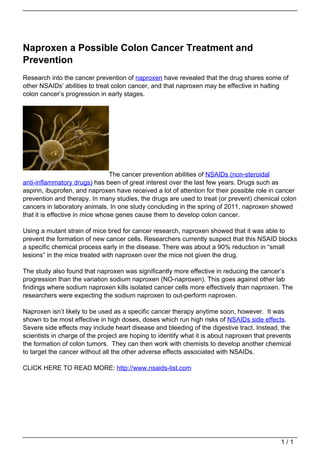
Naproxen a Possible Colon Cancer Treatment and Prevention
- 1. Naproxen a Possible Colon Cancer Treatment and Prevention Research into the cancer prevention of naproxen have revealed that the drug shares some of other NSAIDs’ abilities to treat colon cancer, and that naproxen may be effective in halting colon cancer’s progression in early stages. The cancer prevention abilities of NSAIDs (non-steroidal anti-inflammatory drugs) has been of great interest over the last few years. Drugs such as aspirin, ibuprofen, and naproxen have received a lot of attention for their possible role in cancer prevention and therapy. In many studies, the drugs are used to treat (or prevent) chemical colon cancers in laboratory animals. In one study concluding in the spring of 2011, naproxen showed that it is effective in mice whose genes cause them to develop colon cancer. Using a mutant strain of mice bred for cancer research, naproxen showed that it was able to prevent the formation of new cancer cells. Researchers currently suspect that this NSAID blocks a specific chemical process early in the disease. There was about a 90% reduction in “small lesions” in the mice treated with naproxen over the mice not given the drug. The study also found that naproxen was significantly more effective in reducing the cancer’s progression than the variation sodium naproxen (NO-naproxen). This goes against other lab findings where sodium naproxen kills isolated cancer cells more effectively than naproxen. The researchers were expecting the sodium naproxen to out-perform naproxen. Naproxen isn’t likely to be used as a specific cancer therapy anytime soon, however. It was shown to be most effective in high doses, doses which run high risks of NSAIDs side effects. Severe side effects may include heart disease and bleeding of the digestive tract. Instead, the scientists in charge of the project are hoping to identify what it is about naproxen that prevents the formation of colon tumors. They can then work with chemists to develop another chemical to target the cancer without all the other adverse effects associated with NSAIDs. CLICK HERE TO READ MORE: http://www.nsaids-list.com 1/1 Powered by TCPDF (www.tcpdf.org)